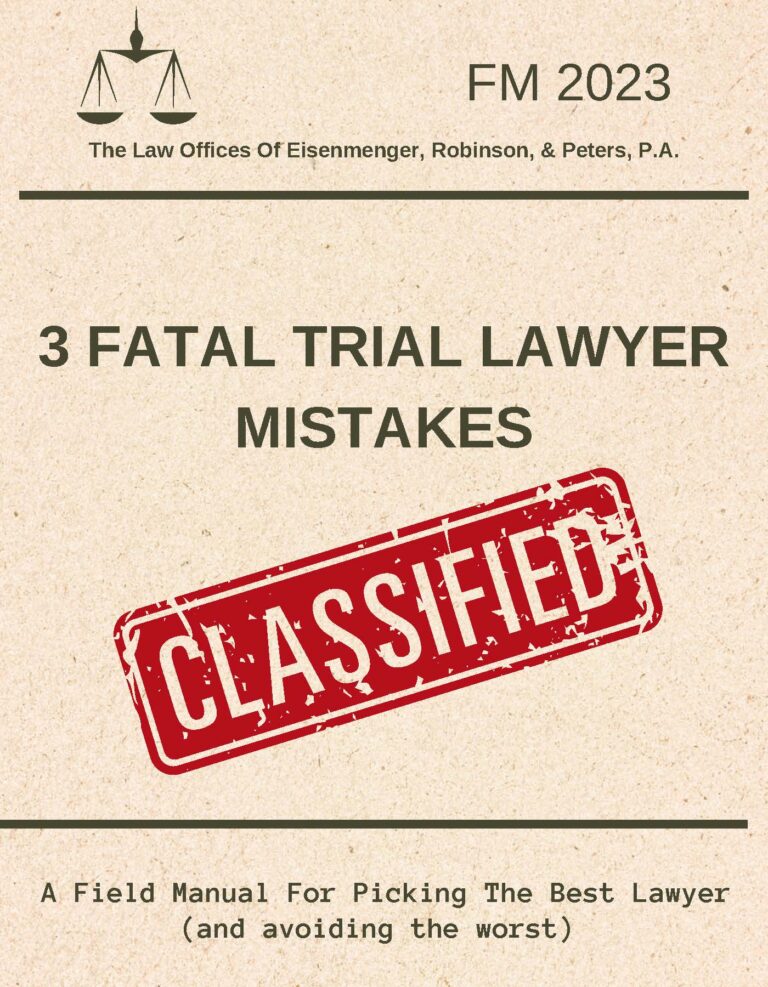What are the Penalties for a Domestic Violence Charge?
On behalf of Eisenmenger, Robinson & Peters, P.A. posted in Criminal Law on Friday, November 18, 2022.
If you’re facing a domestic violence charge, it’s important to understand the full breadth of what could happen. Domestic violence is a serious offense, and it can carry significant consequences. The legal team you choose to represent you and the choices you make right now are critical.
The state of Florida issues aggressive penalties for domestic violence, which is classified as the use of unlawful force on a member of your family or household.
In this article, we’ll take a closer look at the specific penalties for domestic violence and what you can expect moving forward. We’ll also share why it’s essential to partner with a qualified, experienced criminal defense lawyer from our team.
What Is Domestic Violence?
Before we dive into the possible outcomes you could face, let’s take a step back. What are the different types of domestic violence, and which acts fall into this category?
The Florida Legislature defines domestic violence as any act that results in the physical injury or death of one family or household member by another family or household member. These acts can include:
- Assault
- Aggravated assault
- Battery
- Aggravated battery
- Sexual assault
- Sexual battery
- Stalking
- Aggravated stalking
- Kidnapping
- False imprisonment
- Any other criminal offense
Note that for an assault or battery to be considered aggravated, the person must have attempted to inflict serious injury without regarding the life or well-being of the victim. For instance, this might include using a deadly weapon, such as a firearm, during the incident.
When the law speaks of a family or household member, it means anyone who falls under any of these categories:
- Current spouse
- Former spouses
- Anyone related to you by blood or marriage
- Anyone you presently reside with as if a family
- Anyone you have resided with in the past as if a family
- Anyone who you have a child with, regardless of your marital status
To be considered a family or household member, that individual must be currently residing with you in the same dwelling unit or have resided with you in the past. The only exception would be someone with whom you share a child. In that case, residency limitations do not apply.
Penalties for Domestic Violence
If you’re facing a domestic violence case, the future can be a scary place. Before you take the first step, it’s best to partner with a qualified and experienced criminal defense lawyer. We’ll help you navigate the road ahead of you, so you’re aware of what to expect and what’s to come.
Your lawyer is your advocate. Our team is here to help alleviate worry from day one. If you’re out of state and can’t work with us, make sure the lawyer you choose has experience working in domestic violence cases. You should feel comfortable turning to them as your advisor and defender. They should demonstrate their ability to fight for your rights. They should always inform you of the possible outcomes that could occur in your case, and how they will affect your life.
Here are the potential sanctions that the judge could impose on someone found guilty of domestic violence in Florida, and what each one entails.
At Least One Year of Probation
Any person who violates Florida law concerning domestic violence commits a misdemeanor of the first degree. If you are found guilty of this charge or plead no contest to it, then the court will order you to complete a minimum term of one year’s probation. Depending on the specific details of your case, they could require you to spend up to one year in county jail.
In our state, probation is a form of court-ordered supervision. In most cases, it does not require you to stay in jail or prison or remain on house arrest. However, your probation officer will supervise your actions closely, making sure you follow all of the applicable rules and complete any necessary steps.
The only way to remain free and maintain your probationary status is to remain diligent with each command and condition. Anyone found guilty of violating their probation could go to jail. According to the Florida Department of Corrections, there are nearly 145,000 offenders who are currently on probation throughout the state.
26-Week Batterers Intervention Program
As a mandatory condition of your probation, the judge could also require you to enroll in and complete a 26-week Batterers Intervention Program (BIP). This will be a requirement of your sentence unless the court determines not to impose this condition by stating on record why a BIP might be inappropriate for your case.
The BIP is a roughly six-month course that’s designed and managed by the Florida Department of Children and Families (DCF). The goal of the program is to help participants understand and address the root causes of their domestic violence, and equip those individuals with the tools, support, and knowledge they need to avoid committing those acts in the future.
Overall, the BIP will include:
- An initial assessment
- A one-time program orientation
- At least 26 weeks of group counseling sessions
During your initial assessment, the DCF will thoroughly evaluate your psychosocial state. This step helps them understand if you require treatment for outlying mental health or substance abuse issues before or while attending the BIP.
Throughout the program, you will be required to follow strict rules, policies, and procedures. Each counseling session will be about 90 minutes long, and a designated facilitator will manage them. If you fail to attend all of your scheduled sessions, you could be required to leave the BIP.
In turn, this will put you in violation of your probation. There will be a warrant out for your arrest, and you could face an extensive amount of jail time.
Removal of the Right to Possess a Firearm
As part of your domestic violence charge, the judge will also require you to give up any firearm or ammunition that’s currently under your care, custody, or possession, even if the charge is a misdemeanor. This is because violent matters are more likely to escalate to fatalities when there is a gun involved. In fact, more than half of all intimate partner homicides are committed with guns.
This is a federal law, and your charges could increase in scope and severity if you do not comply with this order. In this case, “possession” can mean either actual or constructive.
Actual possession means you physically possess a firearm. Constructive possession means the firearm is not within your physical possession or custody, but you are aware of its location, and you have the intent and power to control its use or disposition. For instance, if you have a gun in your car and know how to gain access to it, that would be considered constructive possession.
Revocation of a Concealed Carry Permit
The right to possess a firearm is one of the civil liberties you will lose if you’re found guilty of a domestic violence offense. Another is the revocation of your concealed carry permit.
If you currently have a concealed carry license, it will be suspended for the duration of your sentence. If you apply for a new license during your probation period, your application will be denied. Any applications in progress at the time of your sentence will be suspended.
Minimum of Five Days in Jail
If the victim of domestic violence experienced an injury of any sort, you will be required to spend a minimum of five days in jail if you are found guilty of the crime. This is a mandatory sentence, and judges will often sentence more than the minimum if you are convicted.
Fine of Up to $1,000
There is also a financial component to your sentence. If the judge finds you guilty of a domestic violence offense, you could be required to pay a fine of up to $1,000.
Keep in mind that this won’t be the only fee you’ll pay if you’re found to have violated of any of the sanctions listed above. For example, if you’re convicted of misdemeanor domestic violence but continue to possess a firearm, you could face a maximum 10-year prison term and be forced to pay a fine of $250,000. Congress enacted this law back in 1996 and it’s listed under 18 U.S.C. Section 922(g)(9).
Hire a Criminal Defense Lawyer to Fight a Domestic Violence Charge
If you’re up against a domestic violence charge, you need someone who can help you fight and understand these charges. The stakes are incredibly high and you need a proven defender with you in the foxhole. There can be serious, expensive, and life-changing consequences with your case and our guidance is crucial.
At Eisenmenger, Robinson & Peters, P.A., we help Florida residents navigate all areas of criminal defense and personal injury law. We know that you might be nervous, scared, and confused. But we’re here to help. Contact us today for your free consultation.
Tags:








